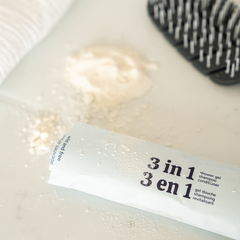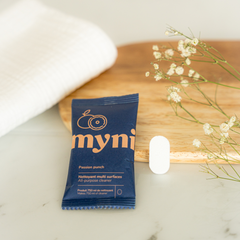Are you someone who loves to gather at the cottage by the lakes or rivers to reconnect with nature in this beautiful autumn season? It's the perfect opportunity to enjoy these enchanting landscapes near the water. Did you know that our daily habits, such as the use of household and personal care products, can have significant impacts on the environment? Here are some toxic ingredients to avoid and their devastating impacts on our precious water streams.
triclosan
Triclosan is a chemical compound used as an antibacterial agent in many products such as soaps, toothpaste, and all-purpose cleaners. This product, designed to kill bacteria growth, can have harmful effects when it ends up in wastewater, as it causes toxicity to aquatic life. The accumulation of these dangerous chemicals disrupts the aquatic ecosystem and the food chain.
phosphates
Phosphates are chemical compounds that act as cleaning agents, among other things, in laundry detergents and dishwasher detergents. They are also found in agricultural fertilizers to promote plant growth. When phosphates are discharged into wastewater and end up in bodies of water, they can lead to major environmental problems. Excessive use of this ingredient promotes the proliferation of algae, creating "green tides" and reducing oxygen levels in the water, which harms aquatic life and its diversity amongst other things.
parabens
Parabens are chemical preservatives commonly used in cosmetic and personal care products such as creams, lotions, shampoos, and makeup to extend their shelf life. When they are released into wastewater, parabens can contaminate our water streams, disrupting the endocrine system of aquatic fauna. Parabens cause developmental abnormalities and hormonal disturbances that affect the entire food chain.
sodium lauryl sulfate (SLS) and sodium laureth sulfate (SLES)
Sodium Lauryl Sulfate (SLS) and Sodium Laureth Sulfate (SLES) are foaming agents commonly used in many personal care products such as shampoos and shower gels. These sulfates can cause skin and eye irritation in some people and even contaminate bodies of water, leading to toxicity for aquatic fauna. A milder, less irritating, and environmentally friendly alternative is sodium coco-sulfate, derived from coconut oil. Opting for products containing sodium coco-sulfate instead of traditional sulfates helps reduce the impact on our water streams while preserving our well-being.
microplastics
Microplastics are tiny pieces of plastic smaller than 5 millimeters that are found in many personal care products, such as face exfoliants, toothpaste, and makeup products. These microplastics are often added to products for aesthetic and exfoliating purposes. However, once they enter wastewater, these microscopic plastic particles are ingested by aquatic fauna, causing health problems and disrupting the food chain up to humans. Reducing the use of products containing microplastics and opting for natural alternatives helps limit plastic pollution in our waters and preserves ecosystems.
alternatives for your family and the environment
use of biodegradable products
Opt for eco-friendly cleaning products, natural personal care products, and choose biodegradable items. This will help preserve the purity of the water streams you cherish.
non-toxic products
We encourage you to seek out environmentally friendly and non-toxic products, like those offered by Myni, to protect both the environment and your health.
what to use?
If you're looking for environmentally safe products for your health, we recommend our revolutionary 3-in-1 product, free of sulfates and toxic ingredients. It's a powder that can be rehydrated with water, reducing your carbon footprint by 90%, and its packaging is compostable.
Similarly, our all-purpose cleaner is an eco-friendly tablet with powerful cleaning properties, reducing CO2 emissions. It's non-toxic and made in Canada, making it ideal for the kitchen, dining room, living room, and even bedroom furniture.
All our products contribute to preserving our planet by using clean-source ingredients and compostable packaging. By choosing our products, you take a step toward a healthier future, where future generations can also enjoy these unforgettable moments by the lakeside.





